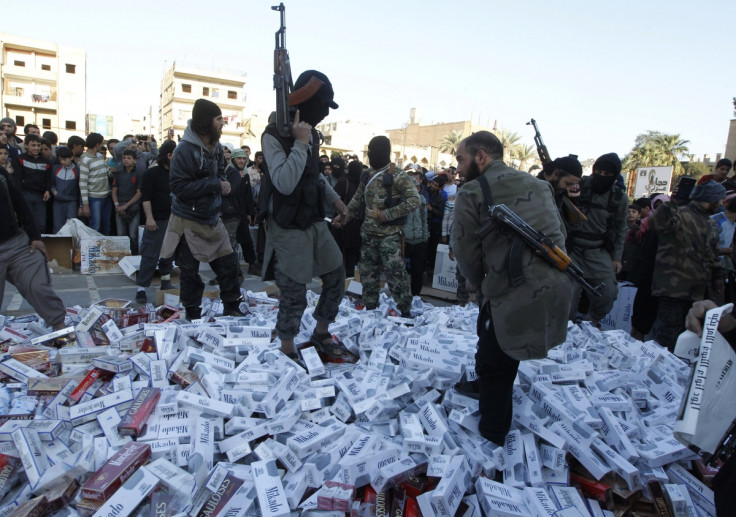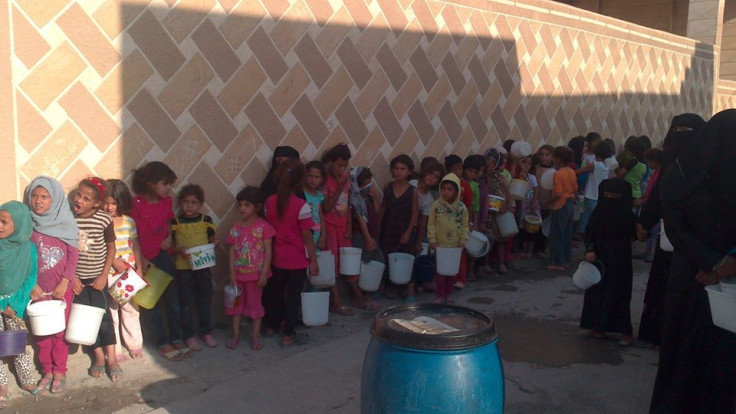Life Under Isis: Robbery, Sex Slaves, and Headless Bodies in the Street

The Islamic state of Iraq and Syria, known to the world as Isis, took control of the northern Syrian city of Raqqa on 13 January, after fighting fierce battles against the Ahrar al-sham movement and Jabhat al-Nusra. Isis' leader, Abu Bakr al-Baghdadi, promptly imposed an Islamic Caliphate, and his men began imposing their own draconian laws.
The militants ordered mandatory school curriculum changes, and closed the universities. Women were ordered to wear the Niqab and forbidden from leaving their homes unless accompanied by a brother, husband or father. Everyone was required to attend prayers, with markets and shops being forced to shut down during the prayer times. Smoking was banned across the city. Anyone who violated any of these laws faced, indeed continues to face, immediate arrest.
Baghdadi and his mob took advantage of the weakness of religious faith among Raqqa's parents, declaring themselves to be the saviours of the people come to oversee the fulfilment of God's laws on earth through the Islamic Caliphate. However, in reality, their actions denigrate Islam; some of them directly contradict the religion's teaching. This is what raised the ire of residents in the province of Raqqa.
Look, for example, at the way the militants repressed people's personal freedoms and trampled on their livelihoods by closing cafes and shops where men and woman may come into contact. This is illegal, and an abuse of Islamic teachings. Then there is the way people have been ordered to pay 'taxes' under the pretext of funding civic services. We see almost nothing of these so-called services in many places.
"I am an employee at the power company and I stopped working after the entry of the Islamic State," says Raqqa resident Om Salma. "My desk has been seized and I was expelled from my place of work. Then the Islamic state ordered the people to pay money in return for providing electricity and water to the people; the FSA [Free Syrian Army] previously provided all these services for free".
Day after day within Raqqa, voices coalesce in condemnation of Isis and their shameful actions. One of the most hated acts has been the recruitment of children under 13 years old to fight in the Syrian civil war; children are brainwashed by Isis leaders while they are at the Mosque, and given $100 each as a bounty to fight, perpetuating and exacerbating the culture of violence.
In the months since their coup, Isis have displaced a large number of Raqqa's non-Muslim residents, including Christians, Kurds and Armenians. Their homes were seized and given to foreign fighters coming from Arab countries and the wider world to fight in Syria.
Ahmed Ali, a 28-year-old from Raqqa, told me that "after the entry of Daash [a local name for Isis], the city became unbearable to live. This was once the city of freedom, or "the capital of liberation" as activists have called it. People had been living in absolute freedom and the city was open for all religions before the entry of Daash. When they came, the conditions became reversed. "

Meanwhile, women have faced an ever-more terrifying ordeal. Many are simply grabbed on the street and kidnapped by the militants, condemned to being used as a sex slave or even being forced to marry a member of the Isis clan.
Maisaa, 22, says: "We have become afraid to leave our house for fear of prosecution. If we wish to marry foreigners, we can be kidnapped; recently six girls were kidnapped and we do not know what their fate will be.
"They [Isis] are degrading the teachings of Islam. They have imposed the Niqab on us and prevented us travelling outside the city without the presence of a male guardian, a 'Muharram', from the family.
"Their activities have recently prevented me from giving my university exams in the city, after the closure of schools and universities. The organization may end up closing all schools and universities and starting a primary school of their own teachings, where they will introduce a book called 'Jihad' for children under the age of 13. This is clearly a major intellectual and social risk to children."
Hospitals in ruins
'We are afraid to leave our house - they are degrading Islam'
When they took control of Raqaa, Isis took control of all the hospitals and health centres as well, and these are falling into disrepair. Ordinary citizens can now only go to the national "government hospital", and this does not have the capacity to handle a huge volume of cases; recently, the hospital's dialysis machines and incubators stopped working. The militants have refused to allow humanitarian aid to enter Raqqa, under the pretext that "they are from the infidels".
"Recently they dismissed the hospital director and appointed a person no older than 18 to replace him" says Dr Hassan Mouhamed, 45.
Meanwhile, many militants live lavishly, despite the obvious hypocrisy this entails. Anyone who disagrees with them, or highlights their abhorrent actions, is punished in the most brutal way possible.
"The Islamic State is punishing the Syrian people under the pretext of religion and cutting them off from almost everything" said local activist Abu Muhammad, 25. "In Raqqa you see lines of people in front of the relief kitchens because of the severity of poverty, while elements of the organisation eat the best types of foods and boast about themselves and their 'Caliphate' on social networking sites.
"We launched a campaign called 'Raqqa Slaughtered Silently' to reveal to the world the vile behavior of Isis in our city. After the launch of the campaign a large number of activists were arrested just because of they are our friends and they support us on the web.
"They executed an activist working for the Sham network named Moataz Bellah Ibrahim. And they have grabbed my home, and the homes of many of the activists in Raqqa.
"I can say that our people in Raqqa city are under the rule of a terrorist organization, who cut heads from bodies and keep them hanging in the streets, simply to terrorise the people of the city."
Zaid Al Fares is a photojournalist who moved from Raqqa, his home city, to Turkey following the Isis takeover. You can find him on Twitter here.
© Copyright IBTimes 2024. All rights reserved.





